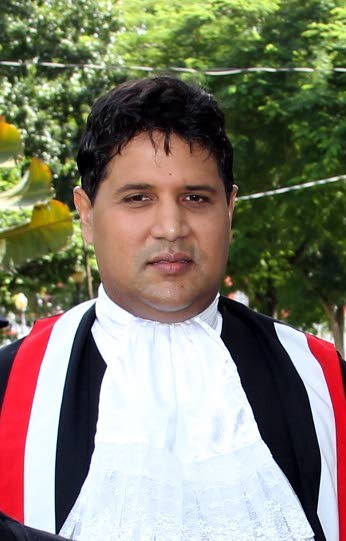Judge concerned as staff roster restricts in-person access to courts

ONE High Court judge is adamant that access to justice in his court will not be “fettered or restricted” even as the Judiciary remains on an alternate-day roster despite new practice directions allowing in-person matters to take place.
Justice Frank Seepersad said it was hoped that “common sense will prevail” to effect a change in the current administrative arrangements for judges and their staff to see them accessing court buildings more frequently as opposed to every other day.
“But if it is not, this court will fearlessly defend the independence of this office.”
Seepersad also warned that the current arrangement can result in trials that exceed a day, being in jeopardy if the court was denied the requisite administrative support.
He made his opinions known on Friday as he addressed attorneys before the start of a series of pretrial review hearings and a civil trial.
He said he held the view that the interests of justice will best be served by in-person hearings as opposed to virtual trials.
“This position is of course subject to legitimate concerns and restrictions with respect to witnesses' availability and health concerns.
“That having been said there seems to be administrative interference with the court's ability to conduct its trials.”
He said with there being a team A and a team B roster, he has only had access to the Hall of Justice two days a week and two days at the San Fernando High Court.
Seepersad said the alternate-day roster was in place before March 11 practice direction which now allows for in-person trials and jury trials.
However, Seepersad said it appeared the practice direction” may have been issued without engaging a practical and comprehensive review of the appropriate administrative adjustments.
“The continuation of rostered-court access practice is impractical, untenable and inconsistent with the practice direction.
“Clarification and rectification of this issue have proved futile, and the continuation of the administrative practice results in a circumstance where a court will not be able to engage in two consecutive days of trial in the same court building.”
He said while most civil cases were completed in a day, a judge had the right to determine the days that trials will be held in Port of Spain, San Fernando or Tobago, pointing out that the practice is that a matter is heard in the jurisdiction in which it has been filed.
“The lack of practicality is pellucid when one considers that most criminal matters last several days, so is it expected that judges and jurors will have to constantly alternate between San Fernando and Port of Spain? A continuation of the roster system would mean that criminal trials in Tobago would be continued every other day.”
On March 11, Seepersad said courtrooms belonged to citizens and those unable to access technology should have access to court buildings.
“It must not be lost that there should always be a human face to justice and we cannot allow the existing technology to replace the need for empathy which is best addressed when there is actual physical engagement.”
He suggested there being blended operations since there were benefits to virtual hearings, but emphasised that physical hearings could not be excluded.
His comments were made hours before the new practice directions were issued by Chief Justice Ivor Archie.
On Friday last week, Seepersad maintained he will not tolerate any encroachment upon his judicial independence and his ability to manage his trial docket. He said any administrative attempt to do so will be strongly opposed.
“The inflexible retention of the roster system will lead to chaos and will cause unacceptable delays in the delivery of justice.”
Attorney Martin George said the pandemic presented two “excellent solutions” of electronic filings and virtual court and wanted the two measures to remain permanent for all civil matters and civil trials.
“Entire trials are done electronically, so even if persons are abroad or out of the jurisdiction, the court can still proceed with evidence being taken by video-link and persons cross-examined and submissions made and the trial concluded.
“It is a much faster, more efficient and seamless way of delivering and dispensing justice as opposed to the old cumbersome way of going in-person for trials and flying-in witnesses or foreign experts, at great expense, when you can just take their evidence by video-link.
Newsday understands a meeting was held on March 14 to devise a plan of action for the eventual resumption of jury trials.
Another civil court judge told Newsday, they intended to continue on the virtual platform for the most part but will utilise the in-person option for those trials that cannot be held virtually because of the complexity of the case or the number of witnesses.
One criminal defence attorney Newsday also spoke with said the new practice directions provided no guidance about mask-wearing during in-person hearings for anyone in the courtroom, particularly as there were different court sizes.
They also raised the issue of limited space in the jury rooms which will not be able to facilitate physical distancing, especially with a 12-member jury.
The new practice directions create a "hybrid hearing" where some aspects will be virtual and some in-person. Prisoners will not be brought to court and they can follow proceedings via a live video feed from the jailhouse.
While judicial officers retained control of the courtroom operations of each trial or hearing, which can be a mixture of in-person or virtual hearings, in the instance of "any jury trial" they must have due regard for the safety and health of members of the jury.
"No juror must be required to sit shoulder to shoulder with another person," the notice said.
Jury trials were suspended since the start of the pandemic in March 2020 and there was only in-person access to court buildings in emergency cases.

Comments
"Judge concerned as staff roster restricts in-person access to courts"